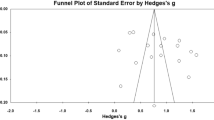Abstract
In this research, the roles of workplace justice, achievement striving behavior and pay satisfaction were used to predict prosocial behaviors. A total of 354 individuals from a consumer products company provided data for this research. Results suggest that achievement striving accounted for unique variance in in-role behavior. Perceived fairness in skill-based pay's certification process showed positive associations with extra-role and in-role behaviors. In support of previous research, pay satisfaction also provided unique contribution to both extra-role and in-role behaviors.
Similar content being viewed by others
References
Adams, J.S. (1965). Inequity in social exchange. In L. Berkowitz (Ed.),Advances in experimental social psychology (Vol. 2). New York: Academic Press.
Alexander, S., & Ruderman, M. (1987). The role of procedural and distributive justice in organizational behavior.Social Justice Research, 1, 177–198.
Bateman, T.S., & Organ, D.W. (1983). Job satisfaction and the good soldier: The relationship between affect and employee “citizenship”.Academy of Management Journal, 26, 587–595.
Blau, P. (1964).Exchange and power in social life. New York: Wiley.
Bluen, S.D., Barling, J., & Burns, W. (1990). Predicting sales performance, job satisfaction, and depression by using the achievement striving and impatience-irritability dimensions of Type A behavior.Journal of Applied Psychology, 75, 212–216.
Brief, A.P., & Motowidlo, S.J. (1986). Prosocial organizational behaviors.Academy of Management Review, 11, 710–725.
Cohen, J., & Cohen, P. (1983).Applied multiple regression/correlation analysis for the behavioral sciences. Hillsdale, NJ: Erlbaum.
Darlington, R.B. (1968). Multiple regression in psychological research and practice.Psychological Bulletin, 69, 161–182.
Farh, J., Podsakoff, P.M., & Organ, D.W. (1990). Accounting for organizational citizenship behavior: Leader fairness and task scope versus satisfaction.Journal of Management, 16, 705–721.
Folger, R., & Konovsky, M.A. (1989). Effects of procedural and distributive justice on reactions to pay raise decisions.Academy of Management Journal, 32, 115–130.
Folger, R., & Greenberg, J. (1985). Procedural justice: An interpretive analysis of personnel systems. In K. M. Rowland & G.R. Ferris (Eds.),Research in personnel and human resource management (Vol. 3, pp. 141–183). Greenwich, CT: JAI Press.
Hatcher, L., Ross, T. L., Collins, D. (1989). Prosocial behavior, job complexity, and suggestion contribution under gainsharing plans.Journal of Applied Behavioral Science, 25, 231–248.
Heneman, H.G. (1985). Pay satisfaction. In K.M. Rowland & G.R. Ferris (Eds.),Research in personnel and human resources management, (Vol. 3, pp. 115–130). Greenwich, CT: JAI Press.
Konovsky, M.A., & Folger, R. (in press). The effects of procedural and distributive justice on organizational citizenship behavior.
Lawler, E.E., III. (1990).Strategic pay. San Francisco: Jossey-Bass Publishers.
Ledford, G.E., Jr. (1990). Three case studies on skill-based pay: An overview.Compensation and Benefits Review, Mar–Apr., pp. 11–23.
Ledford, G.E., & Bergel, G. (1990). Skill-based pay case number 1; General Mills.Compensation and Benefits Review, Mar–Apr., pp. 24–38.
Ledford, G.E., Tyler, W.R., & Dixey, W.B. (1990). Skill-based pay case number 3: Honey-well Ammunition Assembly Plant.Compendation and Benefits Review, Mar–Apr., pp. 57–77.
Lee, C. (1992). The relations of personality and cognitive styles on job and class performance.Journal of Organizational Behavior, 13, 175–185.
Lee, C., Ashford, S.J., & Jamieson, L.F. (1993). The effects of Type A behavior dimensions and optimism on coping strategy, health and performance.Journal of Organizational Behavior, 14, 143–157.
McClelland, D. (1961).The achieving society. N.J.: D. Van Nostrand.
Moorman, R.H. (1991). Relationship between organizational justice and organizational citizenship behaviors: Do fairness perceptions influence employee citizenship?Journal of Applied Psychology, 76, 845–855.
Murray, H.A. (1938).Explorations in personality. New York: Oxford University Press.
O'Reilly, C.A. III, & Chatman, J. (1986). Organizational commitment and psychological attachment: The effects of compliance, identification, and internalization on prosocial behavior.Journal of Applied Psychology, 3, 492–499.
Organ, D.W. (1990). The motivational basis of organizational citizenship behavior. In B.M. Staw & L.L. Cummings (Eds.),Research in Organizational Behavior, (Vol. 12, pp. 43–72). Stanford, CT: JAI Press.
Organ, D.W. (1988).Organizational citizenship behavior: The soldier syndrome. Lexington, MA: Lexington Books.
Organ, D.W., & Konovsky, M.A. (1989). Cognitive versus affective determinants of organizational citizenship behavior.Journal of Applied Psychology, 74, 157–164.
Podsakoff, P.M., MacKenzie, S.B., Moorman, R.H., & Fetter, R. (1990). Transformational leader behaviors and their effects on trust, satisfaction, and organizational citizenship behaviors.The Leadership Quarterly, 1, 107–142.
Puffer, S.M. (1987). Prosocial behavior, noncompliant behavior, and work performance among commission salespeople.Journal of Applied Psychology, 72, 615–621.
Schnake, M. (1991). Organizational citizenship: A review, proposed model and research agenda.Human Relations, 44, 735–759.
Scholl, R.W., Cooper, E.A., & McKenna, J.F. (1987). Referent selection in determining equity perceptions: Differential effects on behaviors and attitudinal outcomes.Personnel Psychology, 40, 113–124.
Smith, C.A., Organ, D.W., & Near, J.P. (1983). Organizational citizenship behavior: Its nature and antecedents.Journal of Applied Psychology, 68, 453–463.
Spence, J.L., Helmreich, R.L., & Pred, R.S. (1987). Impatience versus achievement strivings in the Type A pattern: Differential effects on students' health and academic achievement.Journal of Applied Psychology, 72, 522–528.
Spence, J.L., Pred, R.S., & Helmreich, R.L. (1989). Achievement strivings, scholastic aptitude, and academic performance: A follow-up to “Impatience versus achievement strivings in the Type A pattern”.Journal of Applied Psychology, 74, 176–178.
Summers, T.P., & Hendrix, W.H. (1991). Modelling the role of pay equity perceptions: A field study.Journal of Occupational Psychology, 64, 145–157.
Watson, D., Clark, L.A., & Tellegan, A. (1988). Development and validation of brief measures of positive and negative affect: The PANAS scales.Journal of Personality and Social Psychology, 54, 1063–1070.
Watson, D., Pennebaker, J.W., & Folger, R. (1987). Beyond negative affectivity: Measuring stress and satisfaction in the workplace.Journal of Organizational Behavior Management, 8, 141–157.
Williams, L.J. (1988).Affective and nonaffective components of job satisfaction and organizational commitment as determinants of organizational citizenship and in-role behaviors. Unpublished doctoral dissertation, Indiana University, Bloomington.
Author information
Authors and Affiliations
Rights and permissions
About this article
Cite this article
Lee, C. Prosocial organizational behaviors: The roles of workplace justice, achievement striving, and pay satisfaction. J Bus Psychol 10, 197–206 (1995). https://doi.org/10.1007/BF02249579
Issue Date:
DOI: https://doi.org/10.1007/BF02249579




